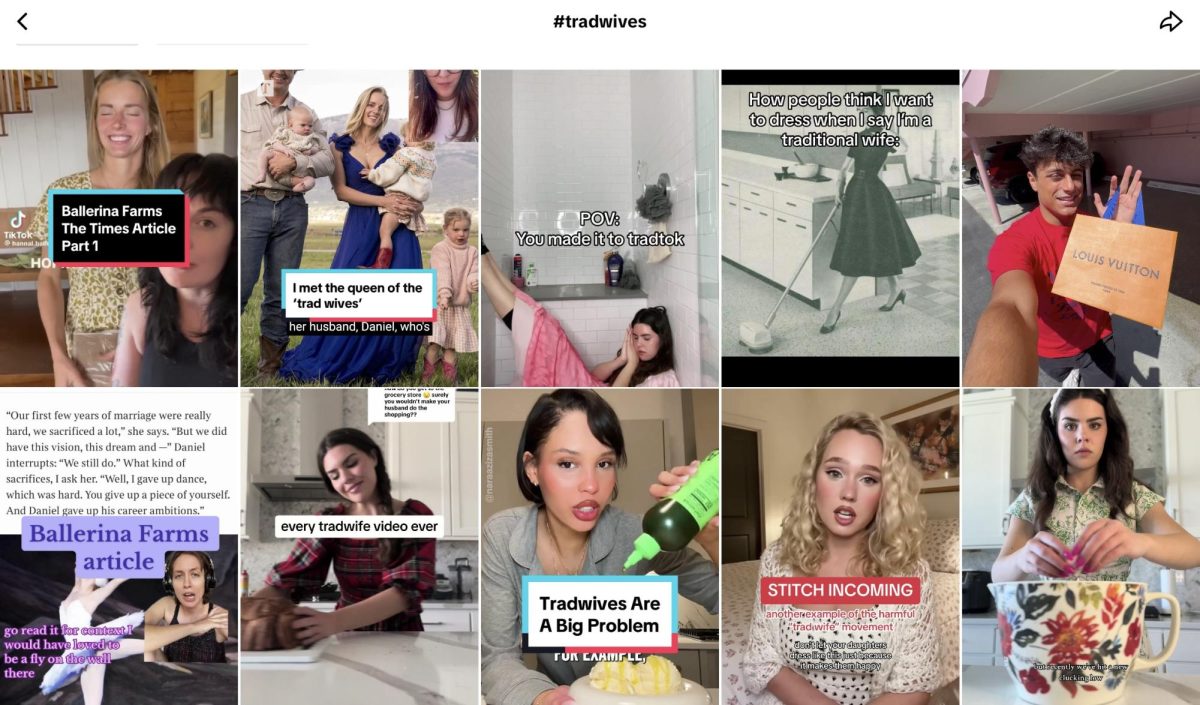“Crunchy” is a term originally used to describe hippie individuals who have environmentally liberal beliefs, as these individuals were known to eat foods such as crunchy granola in pursuit of health. However, this term has recently been embraced as certain “trad wives” tend to also emphasize how healthy or natural certain foods and daily appliances are. The online “trad wife” community is a group of women who embrace traditional gender roles through being homemakers, being stay-at-home moms and doing other “stereotypically feminine” tasks such as cooking and cleaning. Both communities emphasize actions like cooking from scratch for health reasons and sometimes homesteading, which is why they intersect. This “crunchy trad-wife” community, despite having been popularized because of the many who support it, is still heavily critiqued.
By Minsun K. (‘28)
While this “crunchy, trad-wife” lifestyle can certainly have its benefits, it can also be harmful because of the unrealistic, misogynistic ideals it promotes. Because this lifestyle often encourages women to take on the role of the “homemaker” and men to be the “breadwinner” in families, these trad-wives become dependent on their husbands for their finances. With 30 to 40% of marriages in the United States (US) ending in divorce, this proves to be a very risky choice because, if widowed or split, these women will have limited experience with financial independence, possibly leaving them destitute.
Furthermore, the familial dynamics promoted by this lifestyle lead to power imbalances in marital relationships. Most times, with the man single-handedly supporting the family financially and the belief that wives should submit to their husbands ingrained in family structures, the majority of control and authority within the family falls upon the husband, often leaving women substantially more vulnerable to abuse or mistreatment.
Moreover, most of the “crunchy, trad-wife” content that’s circulated on social media tends to be very out-of-touch, setting unrealistic expectations, such as always looking flawless and cooking complex meals from scratch. These content creators, who are mostly white and affluent, are the most noteworthy force in influencing others to adapt to their lifestyle. However, their livelihood is largely unrealistic and can differ dramatically from the average person living a crunchy life. Although these influencers promote female subservience and oftentimes demonize feminist ideals, they are actively benefiting from financial independence by profiting off their content creation. This contradiction disillusions female viewers; women who watch this content and strive to be dependent on their husbands fail to realize that these influencers are actually independent businesswomen. So, it is important to consider how influencers’ situations could look like if they were not sweeping in profits from their accounts because that is the reality that most people aspiring to the crunchy, trad wife lifestyle would face.
At the end of the day, the crunchy, traditional lifestyle is not a wrong choice and can be a great fit for some, but it is still important to be aware of its drawbacks. Someone who fully understands its dynamics and realities could be happy and satisfied with this lifestyle; it is only problematic when seen as an unquestioned ideal, leaving many women unprepared for the very real challenges it could bring.
By Sian P. (‘27)
The “crunchy” lifestyle that has been circulating puts lots of emphasis on health. Through consuming “crunchy” content, many people are becoming aware of and taking more initiative to avoid harmful foods, substances, and other appliances that may harm their bodies. Of course, crunchy influencers aren’t the best place to get health advice—although they do spread awareness about the harmfulness of chemicals and other such substances, they can also be found chewing on entire sticks of butter.
But the thing is, no health advice is perfect, including advice from medical professionals and researchers. Corruption runs rampant in the health industry, and the results of studies are often skewed to benefit sponsors. Additionally, you can find a study to support almost anything, and medical journals frequently contradict each other. Assuming that everyone has some level of common sense and knows not to start snacking on unsafe raw meat because some random influencer told them to, crunchy media can be a great way for people to stay vigilant in protecting their health.
When it comes to the trad-wife aspect of this community, the criticism stems mostly from how it embraces traditional gender roles. Many trad-wife influencers assert that being a homemaker, baking cookies for their husbands and raising children has given them more fulfillment than a career ever could have, and this sentiment is labeled as misogynistic. Although gender roles are heavily intertwined with misogyny because of how the implication that the role of the woman is less important is attached to it, the actual act of embracing the role of being a full-time mother and housewife is not. Despite how there certainly are misogynistic crunchy trad-wives out there, many actually emphasize the importance of the woman and mother, honoring the female role as equal to the man’s, and sometimes even presenting it as more important in the internal workings of a family and home.
The concern that financially dependent women are more susceptible to abuse and mistreatment is completely valid. But this is a commonly known risk of being a housewife, crunchy and traditional or not, and if these women trust their spouses enough and are willing to take the risk of becoming reliant on them then it’s their choice. In the end, any lifestyle has its risks, and there are precautions that can be taken in order to ensure that women aren’t bound to their husbands in fear of losing financial security and that housewives’ work is recognized in the case of divorce. For example, alimony/spousal support, lump sum payments, and other financial clauses can be included in prenups to help ensure housewives’ financial security during and after marriage.
Additionally, when it comes to finances, crunchy trad wives are criticized for promoting a lifestyle only attainable to the wealthy since they make profit from social media. I agree that this does glorify the perception of how most crunchy trad-wives live. However the fact that social media glorifies people’s lifestyles is taught in school lessons about social media usage and is a problem not with the crunchy trad-wife community but with social media itself.
Therefore, this trend and lifestyle has negative impacts including faulty health advice, less financial security, and over glorification of the crunchy-trad wife lifestyle. But with hope that people realize that not everything on social media is true or as glorious as it seems, this trend is positive in the way it promotes awareness about health and presents being a full-time mother and housewife as a possible and fulfilling option for young women.


![A myriad of impressive trophies and awards. [ANNABELLE HSU/THE BLUE & GOLD]](https://blueandgoldonline.org/wp-content/uploads/2025/09/Awards2-1200x512.jpeg)
![Students' calendars say goodbye to exam week. [ANNABELLE HSU/THE BLUE & GOLD]](https://blueandgoldonline.org/wp-content/uploads/2025/09/Exam-week-1200x740.jpg)
![A collection of college flags. [PHOTO COURTESY OF AMBER HU ('27)]](https://blueandgoldonline.org/wp-content/uploads/2025/05/IMG_5029-1200x577.jpeg)

![An SAT word cloud. [PHOTO COURTESY OF WORDCLOUDS]](https://blueandgoldonline.org/wp-content/uploads/2025/05/SAT.jpeg)
![Collage of banned books, including “The Handmaid’s Tale” by Margaret Atwood. [MINSUN KIM/ THE BLUE & GOLD]](https://blueandgoldonline.org/wp-content/uploads/2025/04/IMG_4274-1200x681.jpeg)

